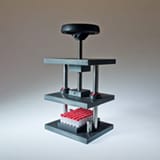Title
Pesticide Analysis in Fruit/Vegetable Juice by LC/MS/MS and GC/MS
Description
A study was conducted using the Bruker EVOQ for the analysis of 250 pesticides in apple, orange, cranberry, white grape and vegetable juices using only one method in store-bought juice and simple sample preparation using the Thomson eXtreme|FV®s in a dilute-and-shoot approach without sample enrichment. LC-MS/MS operated in Multiple Reaction Monito...
Pesticide Analysis in Fruit/Vegetable Juice by LC/MS/MS and GC/MS
Z.Yang, L. Maljers, Bruker, Chemical & Applied Markets (CAM) Division | Uday Sathe, Karin Aylozyan @ Micro Quality Labs, Burbank, CA
A study was conducted using the Bruker EVOQ for the analysis of 250 pesticides in apple, orange, cranberry, white grape and vegetable juices using only one method in store-bought juice and simple sample preparation using the Thomson eXtreme|FV®s in a dilute-and-shoot approach without sample enrichment. LC-MS/MS operated in Multiple Reaction Monitoring (MRM) mode with dual scan Electrospray Ionization (ESI) is widely used for polar, semi-volatile, and thermally labile pesticides in food testing. The Bruker EVOQ Elite LC-Triple Quadrupole System provides fast positive/negative switching, allows for simultaneous determination of hundreds of positive and negative co-eluting compounds numbering in the hundreds. Simple sample preparation is explored using Thomson eXtreme|FV®s for sample clean-up instead of lengthy alternatives like SPE or centrifugation followed by liquid-liquid extraction.
Pesticide residues are toxic when found in sufficient quantities in food. This is of particular importance for orange juice because it is consumed in large quantities. In order to reduce the risk to consumers, sensitive, rapid, and cost effective analytical methods are required. The pesticides in orange juice testing shown below compares recoveries for samples prepared using SPE versus Thomson eXtreme|FV ®.
Related Application Notes
Analysis of Antibiotics in Honey by an Integrated On-Line Extraction UHPLC-MS/MS System
The most critical aspects of reliable food contamination analysis are the reduction of interferences from the sample ma...
See Application NoteScreening and Quantitation of 200+ Pesticides in Honey by an Integrated On-Line Extraction UHPLC-MS/MS System
[A] simple, cost effective and sensitive procedure for screening and quantitation of pesticides in honey using the Thom...
See Application NoteeXtreme|FV® vs SPE for the Analysis of Pesticides in Orange Juice by GC/MS
Pesticides act as toxins when found in sufficient quantities as residues in food. Solid Phase Extraction (SPE) is a com...
See Application NoteScreening and Quantitation of 250 Pesticides in Apple, Cranberry, Orange, Vegetable and White Grape Juices using the eXtreme|FV® by LC/MS/MS
[A]nalysis of 250 pesticides in store-bought juice using one method and simple sample preparation using the Thomson [eX...
See Application NoteRoutine Targeted Quantitation & Identification of Pesticide Residues in Avocado, Carrot, Grape & Orange using the eXtreme|FV® by LC-MS/MS
Thomson eXtreme|FV®s for clean-up, and the Sciex Scheduled MRM Pro Algorithm for identification of pesticides in fruit ...
See Application NoteTea Analysis with eXtreme|FV® by GC-MS
This method investigates whether SPE is required for the analysis of pesticides in green tea leaves using GC-MS.
See Application Note



